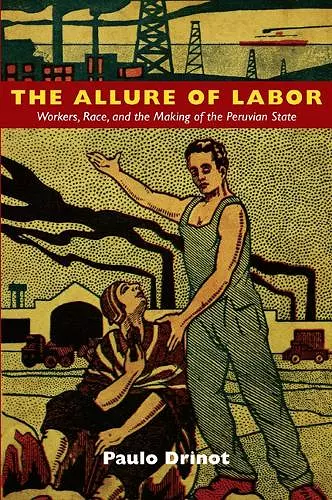The Allure of Labor
Workers, Race, and the Making of the Peruvian State
Format:Paperback
Publisher:Duke University Press
Published:25th Apr '11
Currently unavailable, and unfortunately no date known when it will be back

How intellectuals and policymakers in early 20th century Peru came to believe that industrialization and a modern workforce would transform Peru into a civilized nation
Reveals how Perus early-twentieth-century labor reforms excluded the majority of the countrys laborers. They were indigenous, and the nations elites saw indigeneity as incommensurable with work, modernity, and industrial progress.In The Allure of Labor, Paulo Drinot rethinks the social politics of early-twentieth-century Peru. Arguing that industrialization was as much a cultural project as an economic one, he describes how intellectuals and policymakers came to believe that industrialization and a modern workforce would transform Peru into a civilized nation. Preoccupied with industrial progress but wary of the disruptive power of organized labor, these elites led the Peruvian state into new areas of regulation and social intervention designed to protect and improve the modern, efficient worker, whom they understood to be white or mestizo. Their thinking was shaped by racialized assumptions about work and workers inherited from the colonial era and inflected through scientific racism and positivism.
Although the vast majority of laboring peoples in Peru were indigenous, in the minds of social reformers indigeneity was not commensurable with labor: Indians could not be workers and were therefore excluded from the labor policies enacted in the 1920s and 1930s and, more generally, from elite conceptions of industrial progress. Drinot shows how the incommensurability of indigeneity with labor was expressed in the 1920 constitution, in specific labor policies, and in the activities of state agencies created to oversee collective bargaining and provide workers with affordable housing, inexpensive food, and social insurance. He argues that the racialized assumptions of the modernizing Peruvian state are reflected in the enduring inequalities of present-day Peru.
“The Allure of Labor is an outstanding book, and its contribution to debates about race, identity, and state formation extend its relevance far beyond Peru.”—Charles F. Walker, author of Shaky Colonialism: The 1746 Earthquake-Tsunami in Lima, Peru, and Its Long Aftermath
“In this important book, Paulo Drinot explains perfectly the paradox of Peru’s early-twentieth-century labor legislation. On the one hand, it was comparatively progressive given the country’s level of industrialization. On the other hand, it was entirely inadequate in dealing with the labor conditions experienced by most of the country’s workers. . . . I have long looked for a book that clearly highlights the hopes and fears that ‘modernity’ inspired among Peru’s elites, and the way that their ambivalence was racialized. The Allure of Labor does the trick.”—David S. Parker, author of The Idea of the Middle Class: White-Collar Workers and Peruvian Society, 1900–1950
“The Allure of Labor is an extremely important book that should be read by anyone interested in labor history and the history of populism in the Americas, as well as the social and cultural history of Peru.” -- Nathan Clarke * The Latin Americanist *
“The Allure of Labor argues persuasively that industrialization in Peru was as much a cultural policy as an economic one, through which intellectuals and policymakers came to believe the country would be turned into a civilized nation.” -- Gavin O'Toole, * Latin American Review of Books *
“Drinot’s book provides a fascinating investigation into how the Peruvian state strived to fashion labour into an agent of progress. . . . The Allure of Labor opens up space for fruitful discussions, providing a wealth of historical data on Peru that can enrich existing debates on the racialization of food, space, health and labour.” -- Karem Roitman * Ethnic and Racial Studies *
“Drinot’s inclusion of a broad variety of perspectives is one of the real strengths of this book. We hear from bureaucrats, public intellectuals, lawyers, presidents, communists, APRA activists, anarchists, employers, and workers themselves. The range of workers considered is likewise diverse: bakers and printers, carpenters and sugar workers, telephone operators and oil workers all appear in the book. . . . This is a valuable book for Latin Americanist historians of labor and race, and a crucial read for historians of Peru.” -- Jaymie Patricia Heilman * American Historical Review *
“The Allure of Labor is a path-breaking, revisionist reinterpretation of state policies towards labour and its role in the modernization of Peru in the first half of the twentieth century.” -- Peter Klaren * Social History *
“Paulo Drinot’s The Allure of Labor manages to say a lot of interesting new things about Peruvian workers, in what is an exemplary study of “governmentality” in Latin America.... this is a smart (and not incidentally, superbly written) book... The finest scholarship raises many new questions, and in this spirit I highly recommend The Allure of Labor to the widest historical audience.” -- Paul Gootenberg * Labor *
ISBN: 9780822350132
Dimensions: unknown
Weight: 463g
328 pages